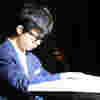Earlier this year, at just 13, Chapman Shum scored a merit in his ARSM piano exam (Associate of the Royal Schools of Music) - an accomplishment equivalent to completing the first year of an undergraduate degree.
This is a huge achievement, not only because Chapman is so young, but because he was born blind, is autistic and has speech and learning difficulties.
By the age of 11, the south west London teenager had passed Grade 8 piano with distinction, similar to achieving an A-level in music. And in the two years since the family moved from Hong Kong, Chapman has performed solo recitals at venues across London including the Royal London Hospital, Westfield shopping centre, Westminster Music Library and Devonshire Square. He plays with the London Youth Folk Ensemble and his classical repertoire includes Bach, Mozart, Grieg and Chopin.
What does he like about performing? “People clapping”, he says simply, and his father, Chun, adds that Chapman finds the audience’s reaction both energising and encouraging.
Chapman was born with an unknown, undiagnosed condition that means he is blind, but has “found his path” in music, say his parents, Chun and Jenny. It feels fitting, adds Chun, that Chapman was born on World Music Day and during Learning Disability Week.
Chun, Jenny and Chapman are sharing their story to inspire people to be determined, especially those who face difficulties in life. Chun says: “Chapman won’t let disability define him.”

“Chapman won’t let disability define him.”
People need to be given the opportunity to shine
Fight for Sight's ambition to tackle sight loss from both a research and social perspective also resonates with the family. Chapman benefits from both clinical services at Great Ormond Street and Moorfields hospitals, and support to tackle social isolation through a “buddy” weekly online befriending scheme at disability charity Sense.
His father says: “People are confused by complex disability, they struggle to understand what we mean by ‘learning difficulties’ and there’s stigma. By sharing our experience, we’re raising awareness that someone may not be able to see and may have learning difficulties, but it doesn't mean they’re incapable of doing something they like. We need to give people the opportunity to shine, and sometimes they need that almost more than the clinical side of things.”
Chun describes Chapman, who is at a special school in London, as “always happy, very positive” and says his favourite activity - aside from playing the piano - is trampolining.
As for support, Chapman has various therapies at school, including occupational and speech and language theory. He also wears transitional lenses (which darken in sunlight and lighten in darker environments) and uses a white cane.
Discovering your baby has a rare genetic condition
When Chapman was born, his parents noticed a cloudy, white cluster in his eyes. Examinations, including CT and MRI scans, revealed that his eyes stopped developing when Jenny was three months pregnant.
Doctors knew a rare genetic disease caused the condition, but could not find a match with any other inherited syndromes. The closest is Norrie disease, a rare disorder causing visual impairment or blindness.
Chun describes the moment he and Jenny discovered their baby was blind as “devastating”: “We were really sad, we didn’t - and still don’t - know what the future holds for him. So we felt depressed because his condition is so rare and there's no diagnosis.”
What changed was the discovery of Chapman’s extraordinary talent, which drove a shift in his parents approach as they did everything possible to support his potential.
Chun and Jenny were stunned when at age five, after a trip to Disneyland, their son began playing the theme park’s signature tune, It’s A Small World, on a toy piano.
Chapman cannot read music, but listens to and memorises the notes, he has perfect pitch and loves to improvise tunes, He even plays every morning before school and has regular lessons, enjoying all genres of music from classical to jazz, pop and folk.
His father recalls: ”In the beginning, playing the piano gave him a purpose - he heard something he liked and his target was to play it. Then later, he began expressing himself through his music. So while he’s not academic and struggles to understand how the world works, music is his thing.”
As well as his piano exam successes, Chapman was named Young Person of the Year in the 2023 Sense Awards and nominated for the 2021 Hong Kong Spirit Award.
For Chun and Jenny, all of this is world away from the despair they experienced as new parents. He says for anyone going through something similar: “Maybe it will take you a while to find out, but try your best to find out what someone is good at or loves doing, and with the right help, they will excel in something that they really like.”
Chapman may well be minimal with his use of language, but he gets across his message about determination loud and clear: “Let difficulties know that you're difficult too.” He adds: “I play music to inspire people. If I can do it, you can do it too.”


